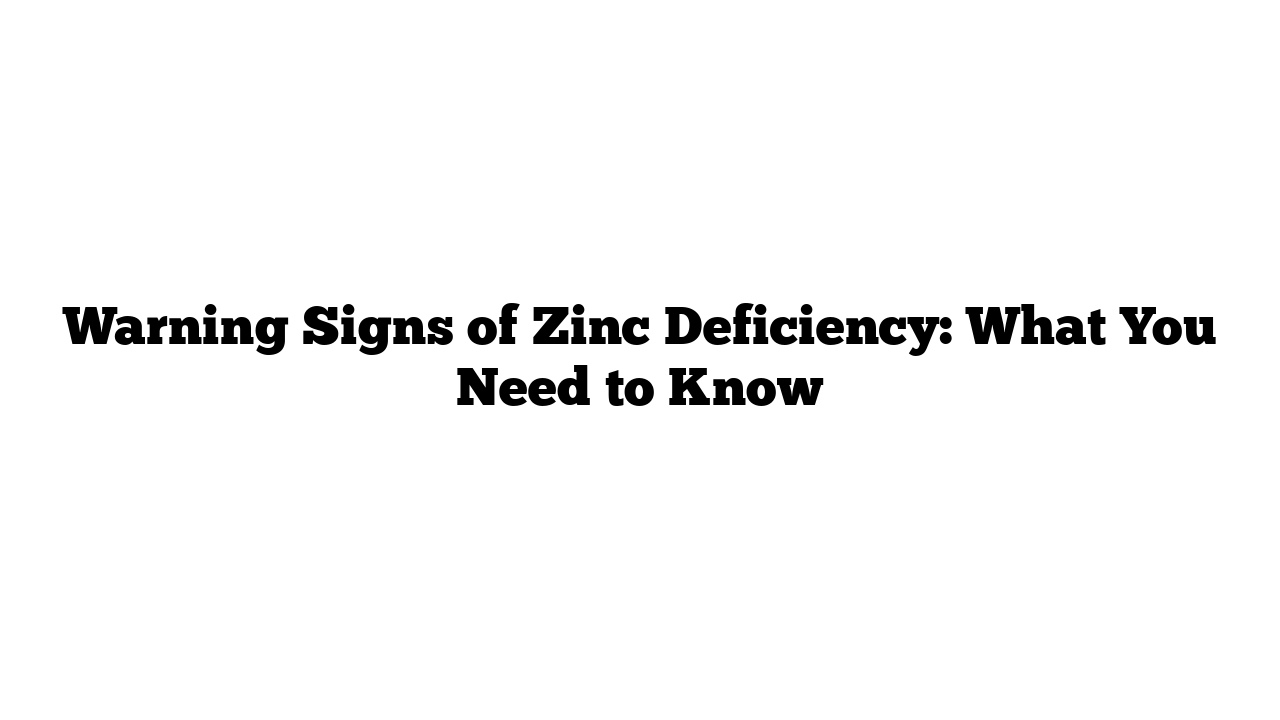Zinc is an essential mineral that plays a crucial role in our overall health. Unfortunately, many people do not realize how vital zinc is until they start experiencing deficiency symptoms. Today, we’ll discuss seven warning signs of zinc deficiency that can make daily life quite challenging.
Why Is Zinc Important?
Zinc is the third most important nutrient for the body, following Vitamin D and magnesium. It supports over 200 enzymes, making it integral to many biochemical processes. Here are some key roles zinc plays in your body:
- Boosts the immune system
- Promotes wound healing
- Supports hormone production (including testosterone)
- Aids in memory function through its presence in the hippocampus
When zinc levels drop, various health issues can arise, and it’s essential to recognize the signs.
The 7 Warning Signs of Zinc Deficiency
1. Night Blindness
One of the first symptoms to look out for is night blindness. If you’ve ever struggled to see while driving at night, this could indicate a zinc deficiency. Zinc is vital for maintaining the health of the retina, and a deficiency can lead to significant vision issues.
2. Low Testosterone Levels
For men, low testosterone can result from inadequate zinc intake. This condition, known as hypogonadism, may lead to smaller testicles and decreased libido. Women can also experience hormonal imbalances, affecting estrogen and progesterone levels, particularly during menopause.
3. Diarrhea
Chronic diarrhea can significantly affect your quality of life. In some cases, it stems from a zinc deficiency, especially in children who consume high amounts of grains. Grains contain phytic acid, which can hinder zinc absorption, leading to digestive issues.
4. Acne
If you’ve battled acne, you might be interested to know that zinc is closely linked to skin health. Low levels of zinc can contribute to breakouts, impacting your self-esteem and confidence.
5. Alopecia (Hair Loss)
Zinc is essential for hair growth and strength. A deficiency can lead to hair loss or thinning, which can be distressing for both men and women. If you notice a combination of acne and hair loss, it could indicate a significant zinc deficiency.
6. Cataracts
Zinc plays a role in eye health, and a lack of it can lead to cataracts, which cause the lens of your eye to become cloudy. This can severely impact your vision and quality of life.
7. Shrinking Thymus Gland
The most alarming sign of zinc deficiency is the shrinking of the thymus gland, the master immune gland responsible for producing T-cells, which fight infections. This shrinkage begins after puberty and continues as you age, leading to a weakened immune system.
What Causes Zinc Deficiency?
Understanding the causes of zinc deficiency is crucial for prevention. Here are some common factors:
- Aging: Zinc absorption decreases with age.
- Gastrointestinal issues: Conditions like Crohn’s disease can affect absorption.
- Limited animal product intake: A vegetarian or vegan diet may lack sufficient zinc.
- Alcohol and sugar consumption: Both can hinder zinc absorption.
- Chronic stress: Increased cortisol levels can deplete zinc.
- Certain medications: Some drugs can affect zinc levels in the body.
To maintain proper zinc levels, consider pairing zinc supplements with copper in a 10:1 ratio (10 parts zinc to 1 part copper) for optimal balance.
Enhancing Your Zinc Intake
Incorporating more zinc-rich foods into your diet can be beneficial. Here are some excellent sources:
- Red meat (beef, lamb)
- Shellfish (oysters, crab)
- Poultry (chicken)
- Dairy products (cheese, yogurt)
- Legumes (beans, lentils)
If you suspect a deficiency, consult your healthcare provider for advice on supplements and dietary changes.
Stay Informed
Keeping an eye on your health is essential, and being aware of these warning signs can help you take proactive steps. If you want to learn more about the benefits of zinc and how to incorporate it into your daily routine, visit medicaltimes.io for additional articles and resources.
